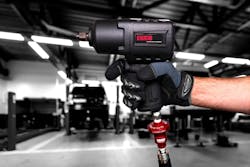Ask the Expert: Why regulate air pressure?
Question: Why regulate air pressure?
Answer:
In the scope of hydraulics and air tools, it is easy to assume that more air translates as more power, but what does this mean for the condition of the internal mechanisms and life of your tools? It may go without saying, but any tool from a reputable manufacturer will have operating air pressure guidelines. In the event of tool and equipment malfunction or failure due to being over-supplied with air, chances are this will void the manufacturer’s warranty. Lengthening the life of your hydraulics and air tools is as simple as maintaining your equipment and regulating air pressure supply per manufacturer’s instructions.
Run efficient
In the circumstance of air regulation, regarding air-powered equipment, less is more. For air/hydraulic pumps, the lower recommended air pressure allows for an air motor to run at maximum efficiency. Overworking your compressor or tools will eventually lead to failure, causing equipment downtime and the expense of repairs or replacement. For an accurate flow of air and to prevent any “pulses,” typically initiated when air compressor cycle and pressure builds within the compressor tank and air hose lines, consider adding a simple, affordable regulator or air pressure reducer to your equipment air line assembly.
Air reducers are a simple, tamperproof device that can be easily installed to the air line assembly of an air-hydraulic pump or air tool to control the air entering the equipment from a compressor. By reducing the air to the recommended pressure, air-powered equipment can avoid being exposed to air pulse irregularities that could lead to equipment malfunction. In order to combat these common issues with air operated tools and equipment ESCO manufacturers air pressure reducers which are available in preset values; 90 PSI for air tools and 110 PSI for air hydraulic pumps. Air regulators also provide the same accuracy and steady flow of air. However, they allow for the reduction and increase of air, which can lead to improper adjustments to manufacturers' recommended settings.
Lengthen the life of your equipment
Most air tools on the market are designed to run on 90 PSI while most air/hydraulic pumps run on 110 PSI. Exceeding the manufacturer's recommended air pressure can damage components, shortening the tool life, and lead to equipment failure, resulting in the voiding of the warranty. For air tools and air/hydraulic pumps, operating at the lower recommended air pressure means in addition to efficiency, less wear and tear will occur to the motor, internally.
In addition to providing the optimal air flow, ESCO’s Air Pressure Reducers contain an internal filter preventing particulates and dust from entering the air motors of air/hydraulic pumps and/or air tools. The application of an air pressure reducer can also assist in preserving the life of your air compressor by running at a lower, optimal pressure. Air pressure reducers can only lower pressure, so they are manufactured to provide the necessary PSI with every use. Lower air pressure means less work for the air compressor.
Equipment failure prevention
Replacing or repairing air-powered tools is expensive, costing upwards of $300.00 USD to replace gasket and seals depending on the severity of the damage. Air pressure regulation assists in the prevention of equipment failure and long-term internal damage to your air-powered tools and equipment. Lengthen the life of your tools and run efficient by following the manufacturer’s maintenance procedures and regulating air to recommended air pressure.
Information provided by Equipment Supply Company (ESCO)
